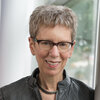Host Terry Gross ("Fresh Air," WHYY, NPR.org, June 20, 2017), Native American author Sherman Alexie; Dusty Springfield; Xochitl, Dhr. Seven, CC Liu (eds.), Wisdom Quarterly

.
 |
| Alexie (Lee Towndrow/Little, Brown & Co) |
"When you tell the truth, it's naturally going to offend people afraid of the truth, afraid of what the truth might force them to do," says writer Sherman Alexie.
On his first day in the seventh grade, Sherman Alexie opened up his school-assigned math book and found his mother's maiden name written in it. "I was looking at a 30-year-old math book," he says -- and that was the moment he knew that he needed to leave his home.
 |
| Terry Gross (WHYY) |
Alexie grew up on the Spokane Indian Reservation in the state of Washington. His mother was one of the few people who could still speak the native language, but she didn't teach it to him. In his new memoir, You Don't Have to Say You Love Me, he describes growing up surrounded by poverty, alcoholism, and violence.
 |
| My mom never told me she loved me, the book |
The reservation school, Alexie explains, not only wasn't preparing him for college; it wasn't even preparing him to think about college. Eventually, he found his way to college and became an award-winning writer.
He received the PEN/Faulkner Award for his short story collection The Lone Ranger and Tonto Fistfight in Heaven, and the National Book Award for Young People's Literature for The Absolutely True Diary of a Part-Time Indian.
He received the PEN/Faulkner Award for his short story collection The Lone Ranger and Tonto Fistfight in Heaven, and the National Book Award for Young People's Literature for The Absolutely True Diary of a Part-Time Indian.
 |
| What are US Indians good for? Orange sales |
"There was more going on in Native American literature in 1991 than there is now," he says. "I kept making the joke about being 'Indian du jour, and it's been a very long day.' "
 |
| Greatest book on US Natives |
"I really hope that like 10 or 12 Native writers, fiction writers, non-fiction writers, really launch into the national consciousness..." he says. "So I don't have to answer all the questions, so I don't have to get invited to all the conferences. Share the burden of being a public figure Indian! Come on, people! Hurry up, finish your books!" More + AUDIO
- Download (44:27)
- VIDEO: Hole discovered in Siberia
- If I could only read one book on Native Americans, which one would Wisdom Quarterly recommend? Roxanne Dunbar-Ortiz's An Indigenous Peoples' History of the United States
































































































































































































































No comments:
Post a Comment